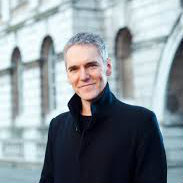
Ian McBride, Professor of Irish and British History at King’s College London, joined the Institute as Patrick B. O’Donnell Visiting Professor of Irish Studies this fall. His time in the Institute was spent developing two projects he is currently pursuing: eighteenth century Ireland and the role of historians in making sense of the Northern Ireland conflict.
The first project considers Jonathan Swift’s political writings. McBride is completing his work editing Irish Political Writings 1: The Cambridge Edition of the Works of Jonathan Swift, complete with a weighty introduction, textual notes and collations of text.
His second line of work involves a forthcoming book titled The Truth about the Troubles: Dealing with the Past in Northern Ireland. According to McBride, this work “will examine attitudes to victimhood and truth recovery, the Bloody Sunday Inquiry, the debate on the future of the Maze Prison/Long Kesh and the contributions that professional historians have made to public understanding of the Northern Ireland conflict.” Given that the Good Friday Agreement is often presented as a pathway to peace for other conflicts, the political and moral dilemmas presented by these subjects have an audience well beyond Ireland.
McBride gave a lecture in the Keough-Naughton Institute on that theme, “Historians, Truth and Reconciliation in Northern Ireland,” as well as a graduate seminar “Talking to Terrorists: the Case of Northern Ireland.”
He found he “benefited greatly from discussing my research with faculty at Notre Dame, in particular Chris Fox, Jim Smyth and Patrick Griffin,” and his previous strong impression of both the high quality of the students and the commitment and creativity of those who teach them was reinforced. Taking this collegiality with him, he is now working to promote closer ties between his colleagues at King’s College and Notre Dame’s London Global Gateway in Trafalgar Square.
After his time with the Keough-Naughton Institute, McBride paid it a high compliment, “the mix of visiting scholars and faculty during my stay produced a lively Irish scene - both scholarly and social - which matches anything on this side of the Atlantic.”